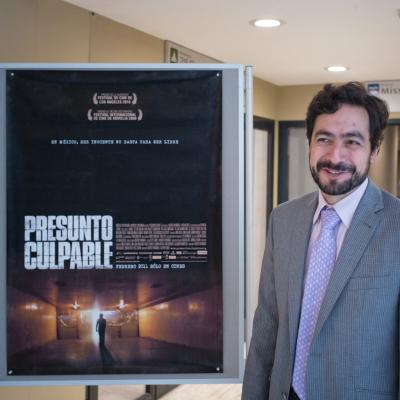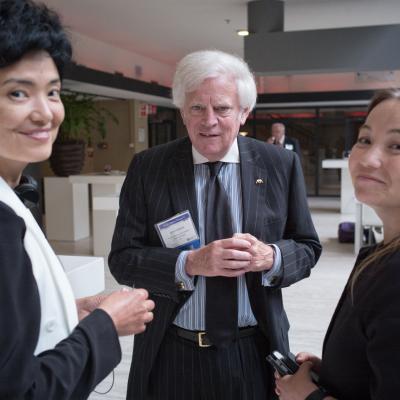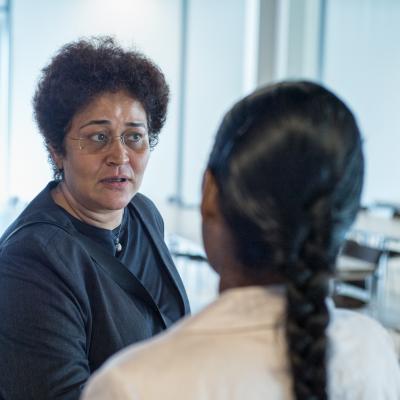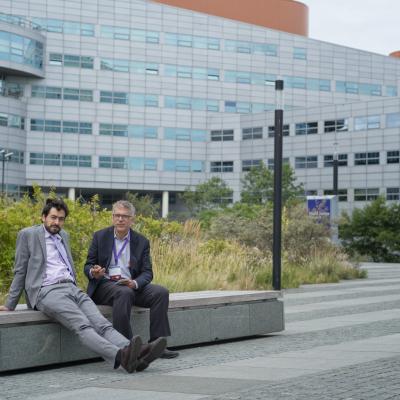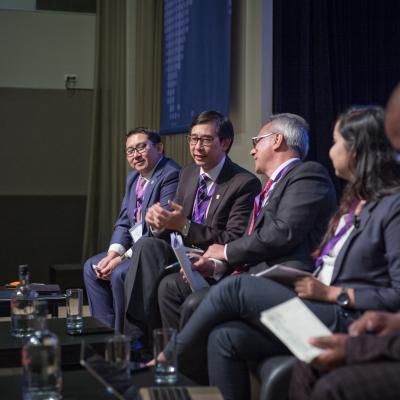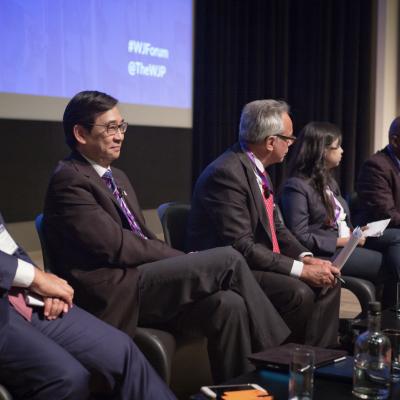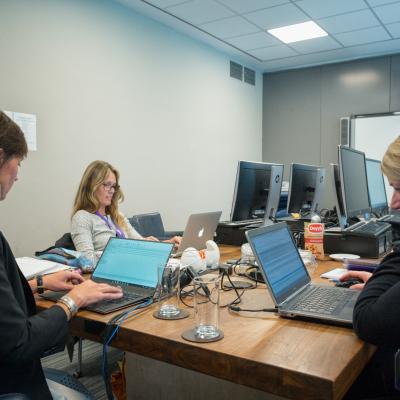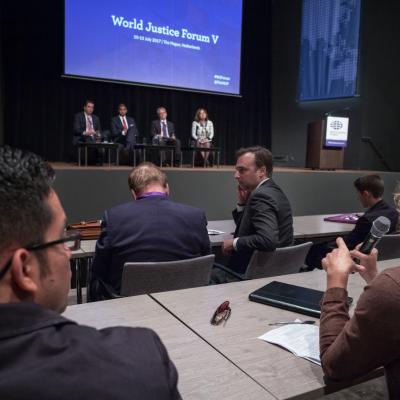Tuesday, 11 July 2017
09.00
Welcome & Introduction
- Mr. William H. Neukom, Founder and CEO, World Justice Project (USA)
Video: "Welcome and Introduction"
09.30
Opening Plenary Keynote Panel: "The Rule of Law in a Time of Geopolitical Change"
- MODERATOR: Mr. William C. Hubbard, Chairman of the Board, World Justice Project (USA)
- Dr. Juan Carlos Botero, Executive Director, World Justice Project (Colombia)
- Dean Elizabeth Magill, Richard E. Lang Professor of Law and Dean, Stanford Law School (USA)
- Mr. John Nery, Editor-in-Chief, Inquirer.net (Philippines)
- Dr. Mamphela Ramphele, Co-Founder and Global Ambassador, ReimagineSA (South Africa)
This panel will explore the recent geopolitical shifts that have occurred around the world, and discuss what these shifts mean for the rule of law and rule of law advocates. Speakers will address how global developments such as the rise of nationalist populism, the closing space for civil society, and increased suspicion of the media are shaping the global landscape and how, in particular, these trends are affecting the rule of law in various regions of the world.
Video: "Plenary Keynote Panel: The Rule of Law in a Time of Geopolitical Change"
11.15
Practical Programs to Advance the Rule of Law: Inspiration and Introduction to Working Sessions
- MODERATOR: Mr. James R. Silkenat, Director and Vice President, World Justice Project (USA)
- Ms. Radha Friedman, Director of Programs, World Justice Project (USA)
- Ms. Sreerupa Chowdhury, Co-Founder, Bribe Hackers (India)
- Ms. Caitlin Fisher, Co-Founder, Guerreiras Project (Brazil)
- Mr. Reinford Mwangonde, Executive Director, Citizens for Justice (Malawi)
- Mr. Shyam Pokharel, Co-Founder, SASANE (Nepal)
Video: "Practical Programs to Advance the Rule of Law"
12.00
Working Session I - Local Program Ideas
Attendees will break into topical groups to share their proposed ideas for action; help one another to workshop and refine their proposed ideas for improved outcomes and potential collaboration; and select program ideas for “fast pitch” on the final day of the Forum.
- Access to Information
- Anti-Corruption
- Arts & the Rule of Law
- Business & Supply Chains
- Customary & Informal Justice
- Education
- Engaging Youth
- Environmental Justice
- Land & Livelihoods
- Post-Conflict Justice
- Security & Counter-Terrorism
- Women, Girls and Health
14.30
Concurrent Topical Panels
A. Combatting Corruption: New Approaches and Proven Strategies
- MODERATOR: Dr. Daniel Zovatto, Director for Latin America and the Caribbean, International IDEA (Chile)
- Ms. Sreerupa Chowdhury, Co-Founder, Bribe Hackers (India)
- Eng. Martin Manuhwa, Vice President, and chair of Anticorruption Committee, World Federation of Engineering Organizations (WFEO) (Zimbabwe)
- Mr. Raymond Ng, Director of Community Relations, Independent Commission Against Corruption (Hong Kong SAR)
- Dr. Fadli Zon, Vice Speaker, Indonesian Parliament; Chair, Global Organization of Parliamentarians Against Corruption (GOPAC) (Indonesia)
This panel will present a combination of new and time-tested strategies to fight corruption from around the world. Participants will hear government officials from both the executive and legislative branches, along with civil society, and non-traditional anti-corruption activists sharing best practices, new approaches and innovation solutions.
Video: "Combatting Corruption New Approaches and Proven Strategies"
B. Data-Driven Criminal Justice Reform
- MODERATOR: Ms. Hilarie Bass, President-Elect, American Bar Association (USA)
- Dr. Alejandro Ponce, Chief Research Officer, World Justice Project (Mexico)
- Mr. Vikrant Reddy, Senior Research Fellow, Criminal Justice and Policing Reform, Charles Koch Institute (USA)
- Prof. Barry Scheck, Co-Director, Innocence Project (USA)
This panel will explore the contributions that data and evidence-based initiatives are making to the field of criminal justice. From fighting crime, improving the efficacy of police work, respecting due process, sentencing convicts, and managing correctional facilities, data holds the promise of improving the delivery of criminal justice. Panelists will discuss several promising data initiatives from around the world, share lessons learned, and highlight the utility of these efforts to shift priorities, improve approaches, raise standards, and promote reform.
Video: "Data-Driven Criminal Justice Reform"
C. Examining the Closing Space for Civil Society Worldwide
- MODERATOR: Ms. Elizabeth Andersen, Director, Rule of Law Initiative, American Bar Association (ABA-ROLI) (USA)
- Ms. Saskia Brechenmacher, Associate Fellow, Democracy and Rule of Law Program, Carnegie Endowment for International Peace (USA)
- Ms. Ingrid Srinath, Director, Centre for Social Impact & Philanthropy, Ashoka University (India)
- Dr. Dhananjayan Sriskandarajah, Secretary General, CIVICUS (Australia)
The closing space for civil society has been well documented in recent years. A number of reports by major international organizations have highlighted the crisis facing international aid groups and local non-profits, noting that the trend has continued to spread and affect a variety of countries around the world. In this panel, experts will examine the phenomenon and discuss key factors driving the trend, including the increasing legal, logistical, security, and public relations barriers governments impose against civil society. Panelists will consider what the trend means for the traditional NGO model and why it has been so difficult for international institutions and aid providers to push back. Going in depth, speakers will discuss how to balance the need for regulating cross-border charitable activities against the potential for over-restricting and repressing vital aid and resources, particularly whether regulations on anti-money laundering and terrorist financing concerns reduce risk or increase the potential for abuse by pushing high-risk charities to smaller financial institutions. Panelists will close by highlighting new strategies and approaches in responding to the trend, along with showcasing existing tools and best practices.
Video: Examining the Closing Space for Civil Society Worldwide"
D. How Rule of Law Matters to Public Health
- MODERATOR: Dr. Harris Pastides, President, University of South Carolina (USA)
- Hon. Oagile Bethuel Key Dingake, Judge of the High Court of Botswana; Judge of Residual Special Court for Sierra Leone; Co-Chair African Think Tank on HIV, Health and Social Justice - UNAIDS (Botswana)
- Dr. Angela Pinzon, Professor of Medicine, University of Rosario (Colombia)
Health outcomes have been found to be associated with a variety of social factors, including socioeconomic, political, and cultural considerations. Increasingly, however, the rule of law has also been found to be an important foundational determinant of health outcomes that potentially underlies other social components. In this panel, experts will discuss the importance of the rule of law in promoting healthy communities. Participants will hear from researchers exploring the link between the rule of law and public health, along with strategies to coordinate international responses and programs to draw on this new finding. Finally, speakers will showcase local, practical ideas and responses to address rule of law challenges affecting public health outcomes.
Video: "How Rule of Law Matters to Public Health"
18.00
Film Screening: "Presunto Culpable" (Presumed Guilty)
- Discussion following, with Director/Producer Mr. Roberto Hernández(Mexico)
Photos: Daniel Maissan for World Justice Project


